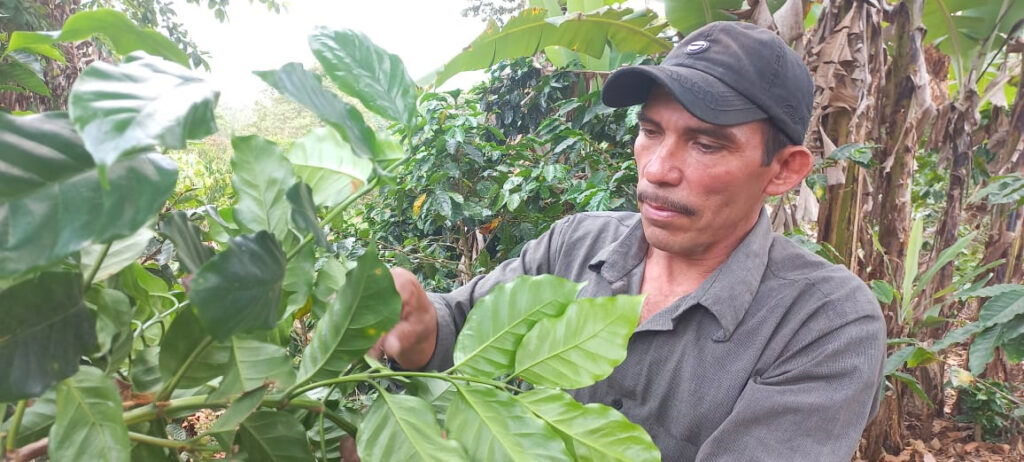When Rust affected Eusebio Sarante’s coffee plantations, he thought he would lose everything. He had started very young at only 16 years old, planting half an apple, back in 1994. He cut the first fruits two years later, in 1996 and said he felt “very good”, he saw the future with enthusiasm; He wanted to grow and he did, acquiring two apples, which later the rust would destroy, leaving him in ruin.
“I fought non-stop, applying products to recover the plant but it was of no use. I had to start from scratch. I suffered with my wife and my son because we had run out of money to pay the bills that the Rust generated for me. In desperation, he looked for a loan and managed to renovate the farm, but his situation did not improve, since his productivity was still low.
But Eusebio’s luck changed when he decided to join MOCCA training. Urged for a solution, he saw the opportunity to improve and provided his farm as a demonstration plot for the MOCCA training program. These plots function as laboratories in which, with the accompaniment of a technician, the different techniques of good agronomic practices are applied. The producers learn and return to their farms, and then put it into practice. “When I saw that the practices gave me the expected results, then I regained confidence in cultivation,” says Eusebio.
“I started with MOCCA in 2020 and by then I was producing 8 quintals of golden coffee per apple: now I produce 25 quintals. It’s something great,” he says enthusiastically.
“Having improved yields and reduced pest management and fertilization costs, allowed him to free the farm from the mortgage and informal lenders.” “I can manage it better, since thanks to the Demonstration Plot I did a soil analysis, and now I know what my coffee plantation is lacking and I don’t spend on fertilizers that are not necessary.”
MOCCA is a 7-year initiative funded by the United States Department of Agriculture (USDA) through its Food for Progress Program, which seeks to improve agricultural productivity and expand trade in agricultural products. The MOCCA project is being executed by a consortium led by TechnoServe.
Better quality: better prices
In three years of training, Eusebio, his wife and his son have applied everything they have learned. “My plants were not old but they were very worn out, one of the first practices I did was regulate the shade and manage the tissues, I did different types of pruning and fertilized as the MOCCA technician recommended. Then I saw that the plants responded very well, so I try to do every recommended practice as best as possible: putting drill bit traps, making drainage, working with plant cover, having as many productive plants as possible and a nursery for emergencies. . We do not leave empty spaces in the growing area.”
Eusebio is part of the producers who are trained under the alliance established by MOCCA and Mercon, through which more than 5 thousand coffee producers have received training and established direct commercial links.

“I have improved the quality of my coffee and you can appreciate the color, the smell; There is no damage to the grain due to drilling, it has a good shape and size,” says Eusebio. “Before, I delivered coffee of different qualities and they gave me a fairly low price. I learned to produce quality coffee and now they pay me 13 dollars more for each quintal of airy parchment,” he says happily.
With the profits the family has bought a pulper, an engine and a used motorcycle for traveling. In the kitchen you can also see a new mill for grinding corn. A part of the house that had damaged wood is now filled with new wood and the floor, which was dirt, was changed to tile. He has half a block of coffee in development and is fencing the boundaries of his farm with barbed wire. He hopes to plant a little more and send his youngest son to college. At 45 years old, with 3 children and a wife, life smiles again at Eusebio, while he admires the coffee plantation, which shines with vigorous green under the temperate shade, he feels optimistic because the difficult days seem to be behind him.







